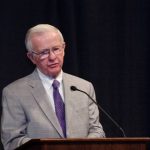 Each month, we ask a member of the Vanderbilt Divinity School faculty to recommend a book they are currently reading. Our August recommendation is offered by Joe Pennel, Professor of the Practice of Leadership.
Each month, we ask a member of the Vanderbilt Divinity School faculty to recommend a book they are currently reading. Our August recommendation is offered by Joe Pennel, Professor of the Practice of Leadership.
Professor Pennel recommends The Triumph of Faith: Why the World is More Religious than Ever by Rodney Stark.
After reading Rodney Stark’s book titled The Triumph of Faith: Why the World is More Religious than Ever, I have reviewed my previously held notions about the demise of faith in today’s world. Stark, a sociologist of religion, explodes the myth that people around the globe are throwing religion out the window. He relies on surveys from 163 nations to explain why religion is growing.
He argues that the world is not merely as religious as it used to be. It is more religious than ever before. The chapters present statistics on the global religious awakening, giving special attention to large geographical regions. In growing numbers, people in many parts of the world are attending temples, mosques, pagodas, chapels, churches, and small religious groups. According to the surveys, most people who do not attend say they are religious.
He explores both the bright side and the dark side of this growth. In writing about the dark side, he demonstrates how religious enthusiasm can be the root cause of religious hatred and acts of terror. Pain is caused by the combination of globalization and the worldwide intensification of religiousness. On the bright side, Stark documents how people do think about meaning and the purpose of life. People from around the world would not say that life has no design, no meaning, and no purpose. Deep in the heart of people there is a desire to love and be loved and to belong to community. Religion provides answers to these everyday existential questions.
Rodney Stark relies on surveys of more than a million people who live in 163 countries to show that religion is not on the wane. He states, “Eighty-one percent claim to belong to an organized religious faith; 74 percent say that religion is an important part of their lives; 50 percent say that they have attended worship in the past seven days; 56 percent believe that ‘God is directly involved in things that happen in the world’; in very few nations, do as many as 5 percent claim to be atheists; and only in Vietnam, China, and South Korea do atheists exceed 20 percent.” His research points to the fact that only in parts of Europe are the churches are more empty than full. The author maintains that this is not the result of secularization. Europe is a continent of “believing non-belongers.”
Stark argues that secularists have been predicting the near death of religion for generations. He maintains that they are wrong and that the global family is more religious than ever. Some will not agree with his conclusions, but his book has caused me to have second thoughts about what I thought I knew.